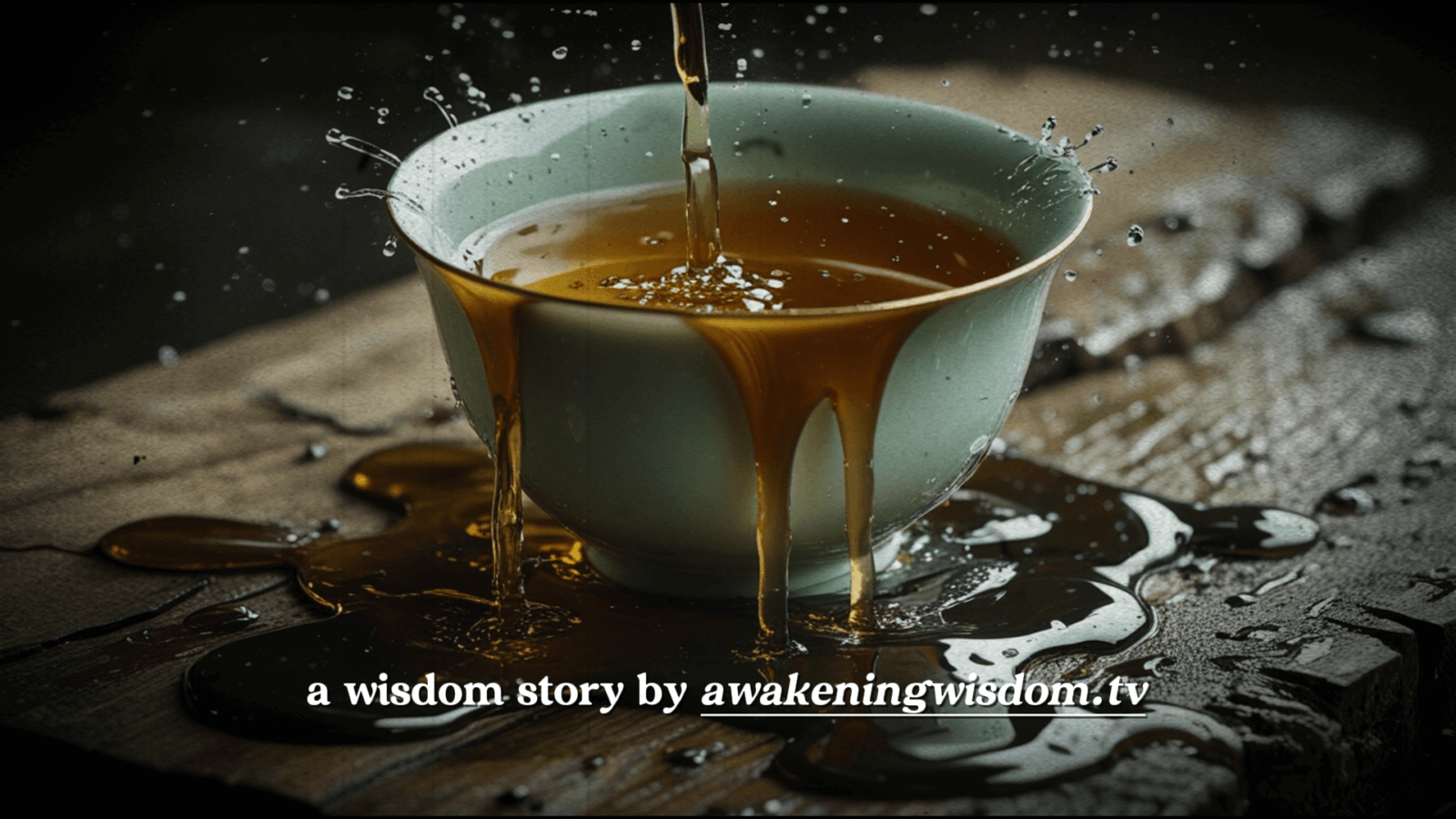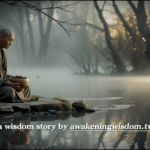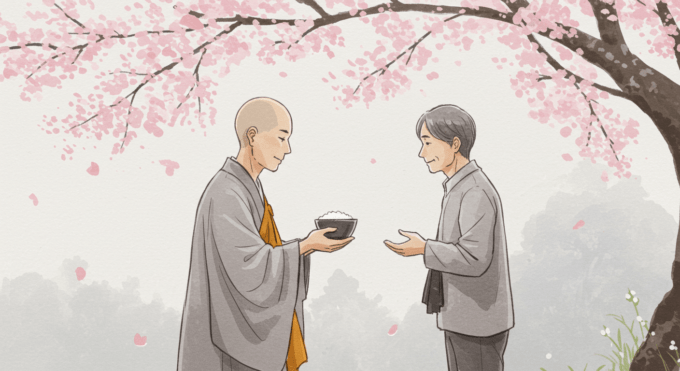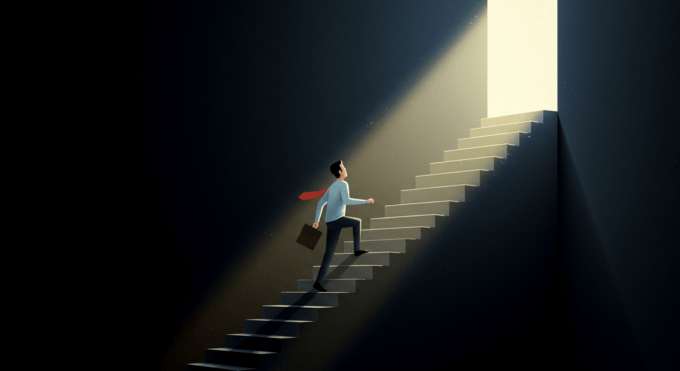A Story of a scholar seeks wisdom from a Zen master but learns a surprising overflowing cup lesson that changes his understanding of knowledge.
A Scholar Arrives Seeking Wisdom
A well-known scholar had spent his entire life in pursuit of knowledge. He had read countless books, debated with great minds, and memorized the most complex philosophies. People admired his intellect, and he prided himself on having answers to every question.
Yet, despite his vast knowledge, he felt something was missing. He sensed a gap in his understanding, an emptiness that no amount of reading could fill.
One day, he heard of a Zen master who lived in a quiet mountain monastery, known not for speaking many words but for imparting wisdom in the most unexpected ways. Intrigued and eager to test the master’s teachings, the scholar embarked on a journey to meet him.
Upon reaching the tea house where the Zen master resided, the scholar felt a wave of calm wash over him. The place was simple yet elegant, nestled among cherry blossom trees. He took a deep breath, convinced that he would finally receive the knowledge he sought.
The Zen Master Begins Pouring Tea
As the scholar entered, the Zen master acknowledged him with a slow, respectful nod and gestured for him to sit on a woven mat. The room was silent except for the faint whistle of a kettle boiling water.
The scholar wasted no time. “Master,” he said, “I have traveled far to learn from you. I have studied philosophy, literature, and science. I have debated scholars and wise men. But I still seek greater understanding. Please, share with me your wisdom.”
The Zen master did not respond immediately. Instead, he began preparing tea with careful, measured movements. He scooped the tea leaves with precision, poured the hot water into the pot, and allowed the aroma to fill the air. The scholar watched impatiently, wondering why the master was delaying his response.
Minutes passed. The only sound was the soft clinking of porcelain cups. The scholar’s curiosity turned to mild frustration. Was this a test? A lesson in patience?
At last, the master lifted the teapot and began to pour tea into the scholar’s cup.
The Cup Overflows With Tea
The scholar watched as the tea streamed into the cup, quickly filling it to the brim. But the Zen master did not stop. He continued pouring, and soon the tea spilled over, cascading onto the table and dripping onto the floor.
The scholar’s eyes widened. He instinctively pulled back, lifting his hands to avoid the hot liquid.
“Master!” he exclaimed. “The cup is full! It cannot hold any more tea!”
The Zen master finally looked up, his expression calm and unbothered. “Like this cup,” he said, “your mind is already full. Full of knowledge, full of opinions, full of certainty. How can I teach you anything if there is no space for something new?”
Lesson of Overflowing Cup
The scholar sat frozen, his mind racing. He had come expecting a conversation filled with deep philosophical debates, intellectual challenges, and intricate explanations. Instead, he had received something far more profound—a simple yet undeniable truth demonstrated without a single complex word.
He looked down at the tea still dripping from the table. The image of the overflowing cup stayed in his mind. He had believed that wisdom was about gathering more—more knowledge, more facts, more theories. But was that truly the path to understanding?
For years, he had prided himself on being the most knowledgeable person in the room. He had filled his mind to the brim, eager to prove his intelligence. But now, in the presence of the Zen master, he realized that his mind had been too full to accept anything new. He had been so focused on accumulating knowledge that he had never paused to create space for deeper wisdom.
The master had not scolded him, nor had he delivered a long speech about his faults. Instead, he had shown the scholar the answer through action. The overflowing cup was not just a lesson about learning—it was a lesson about humility, about letting go of ego, about understanding that true wisdom does not come from knowing everything, but from the willingness to listen, to be open, and to unlearn what no longer serves.
The scholar lowered his gaze, humbled. He had come to test the Zen master’s wisdom, but instead, it was his own understanding that had been tested—and found lacking.
The Scholar Learns To Let Go
For several moments, the scholar remained silent, staring at the tea-soaked table. His mind, which had always been quick to form arguments and counterpoints, had nothing to say. He felt an unfamiliar sensation—humility.
He had spent years believing that knowledge was something to be conquered, collected like treasures, or wielded like a weapon in debates. But the overflowing cup had shown him otherwise. Knowledge, when hoarded without reflection, became stagnant. A mind too full of its own thoughts had no room left for learning, no space for growth.
His ego resisted the realization. He had always taken pride in being the most intelligent person in any room. He had traveled great distances to challenge the Zen master, certain that he would return with a new layer of wisdom to add to his vast collection. Instead, he had been shown the limits of his own mind.
After a deep breath, the scholar bowed his head and asked, “Master, how do I empty my cup?”
The Zen master’s expression remained calm, yet his silence carried the weight of an answer. He did not hand the scholar a book or recite an ancient teaching. Instead, he simply lifted the teapot once more and poured a fresh cup—this time stopping just before the liquid reached the rim.
The message was clear. Letting go was not about abandoning knowledge but about balancing it with openness. It was about making space, about recognizing that the search for wisdom was not about accumulating more facts but about deepening one’s understanding.
The scholar slowly accepted the cup, cradling it in his hands. For the first time in his life, he did not feel the need to impress or prove anything. Instead, he simply sat in the moment, embracing the silence and the lesson it carried.
The Overflowing Cup Teaches Humility
The greatest barrier to wisdom is not ignorance but arrogance—the belief that we already know all there is to know. The lesson of the overflowing cup teaches us that before we can gain deeper understanding, we must first be willing to create space for it.
Many people go through life convinced that learning means filling their minds with more and more information. They gather facts, read books, and memorize concepts, assuming that this accumulation alone makes them wise. But wisdom is not about how much we know; it is about our ability to remain open to new perspectives, even when they challenge what we believe to be true.
In today’s world, where opinions are shouted louder than they are understood, and where people are quick to defend their views but slow to question them, the overflowing cup serves as a powerful reminder. True wisdom requires humility—the ability to admit that we do not know everything, the courage to listen rather than argue, and the patience to let go of ideas that no longer serve us.
The scholar arrived seeking to prove himself, but he left with something far greater: the understanding that learning is not about knowing more but about being open to growth.
With a final bow, he stepped out of the tea house, not with a mind heavier with knowledge, but with a heart lighter with wisdom. He had emptied his cup—just enough to begin filling it again, the right way.









Leave a comment